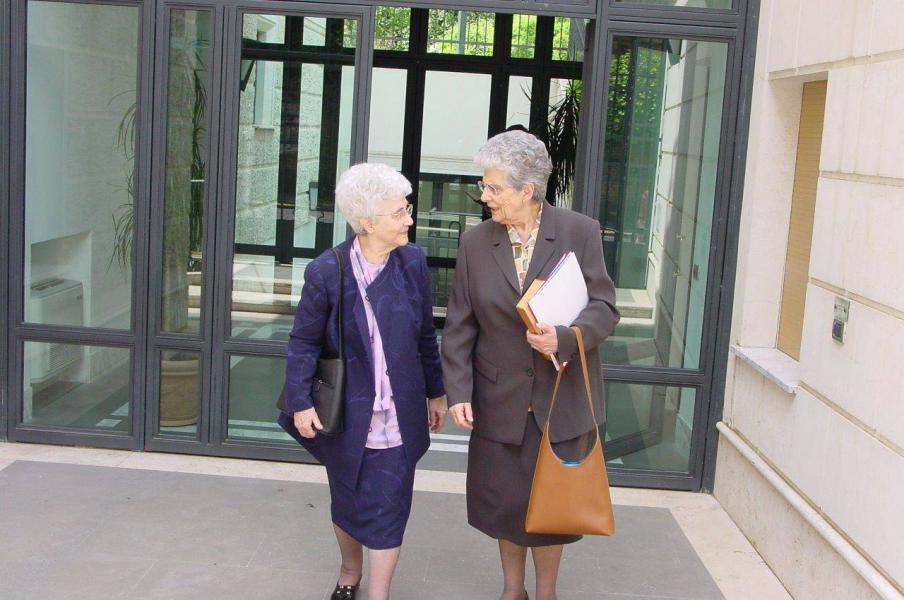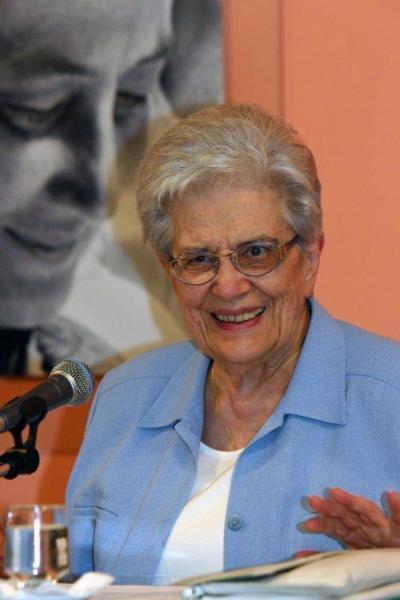 Eli always accompanied the founder of the Focolare Movement on important encounters with the great dignitaries of our time: from Pope Paul VI to John Paul II, from Mother Teresa of Calcutta to Vaclav Havel and the Ecumenical Patriarch of Constantinople, Athenagoras I. Her testimony as a direct witness to these events is contained in the book Lo spartito scritto in Cielo. Cinquant’anni con Chiara Lubich (“The Score Written in Heaven. Fifty years with Chiara Lubich” (Città Nuova, 2012). Giulia Eli Folonari was the Director of the Chiara Lubich Centre since its foundation in July 2008, right up until 2014. This institute aims to be a custodian of the thought of Chiara Lubich, to assure its authenticity and to help spread her charism, as well as to preserve the history of the Focolare Movement through meetings, conferences and a dedicated website. The Centre ensures that the rich patrimony of paper-based archives and multimedia documents that the founder of the Opera di Maria left behind is made available to scholars and the public in general.
Eli always accompanied the founder of the Focolare Movement on important encounters with the great dignitaries of our time: from Pope Paul VI to John Paul II, from Mother Teresa of Calcutta to Vaclav Havel and the Ecumenical Patriarch of Constantinople, Athenagoras I. Her testimony as a direct witness to these events is contained in the book Lo spartito scritto in Cielo. Cinquant’anni con Chiara Lubich (“The Score Written in Heaven. Fifty years with Chiara Lubich” (Città Nuova, 2012). Giulia Eli Folonari was the Director of the Chiara Lubich Centre since its foundation in July 2008, right up until 2014. This institute aims to be a custodian of the thought of Chiara Lubich, to assure its authenticity and to help spread her charism, as well as to preserve the history of the Focolare Movement through meetings, conferences and a dedicated website. The Centre ensures that the rich patrimony of paper-based archives and multimedia documents that the founder of the Opera di Maria left behind is made available to scholars and the public in general. Welcome to the new focolare.org!
A new look and new capabilities for the Focolare Movement’s website It is eight years since this website was last restyled. The graphics have changed but so has the structure of the site, with shorter articles containing infographics and video-clips. The new structure allows greater integration with social media and is mobile-friendly, in view of the increasing use of mobile phones for information and communication. New features include diversified and personalised content that users can access The articles in the main pages of the former website can still be accessed. They are now grouped in a few e-books. Instead, the news can be found in the archive section. Updates on many aspects of the life of the Focolare Movement can now be found in the community area called “Mariapolis”, the name given to the summer meetings of the Focolare worldwide which was also used for the Newsletter published in hard copy [in Italian] until December 2018. From 2019, a pdf “Mariapolis Newsletter” will be prepared bi-monthly, containing the most important news items. In this area a notification system lets users choose when, on what topics and on which device (computer, tablet or mobile) they wish to receive information. The new site is the result of an on-going process over a two year period at the international centre of the Focolare Movement at Rocca di Papa (Rome). This has led to the creation of a single Communications Office, operational since 1st February 2018. It brings together the work done previously by four separate entities. The aims of this Office include: collecting news of the life of the Movement worldwide and communicating it via various media; promoting the Focolare’s activities and making the Movement itself better known through a variety of communications channels; to contribute to an ever growing sharing of life and news among the Movement’s many communities throughout the world. Enjoy surfing!

